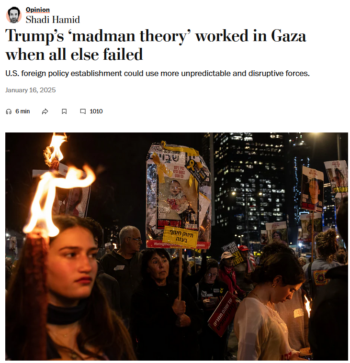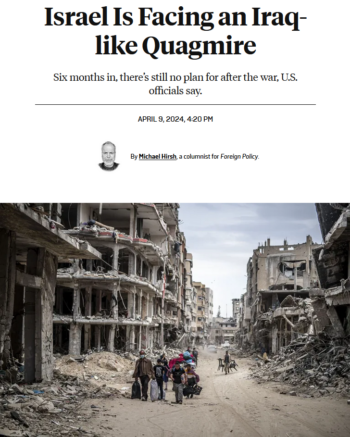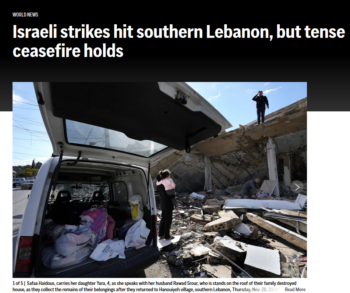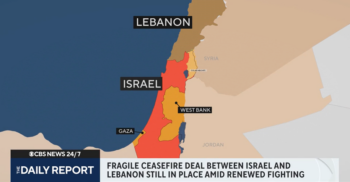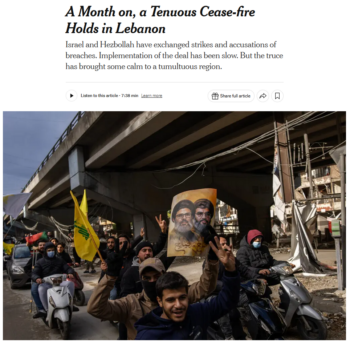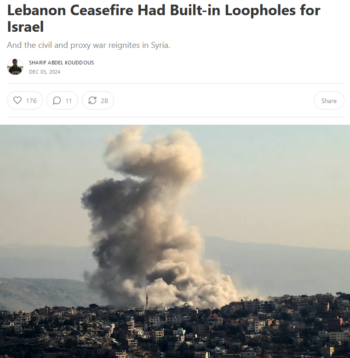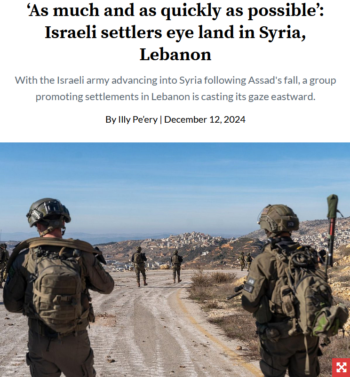Israeli forces used at least one U.S.-provided weapon in a series of strikes that killed dozens of civilians in northeastern Lebanon last year, in attacks that were likely in violation of international law and should be investigated as war crimes, Human Rights Watch says in a new report. The group investigated several Israeli strikes between September 25 and November 21, 2024 in Younine…
-
In recent months, the Israeli Defense Forces have been much taken by a term that augurs poorly for peaceful accord in the Middle East. “Security zones” are being seized in the Gaza Strip, Lebanon and Syria. Land is, for claimed reasons of self-defence, being appropriated with brazen assuredness. It is hard, however, to see this latest turn as anything other than a de facto military occupation, a situation that will prolong the crisis of vulnerability the Jewish state so wishes to overcome. Israel’s insecurities are much the result of various expansions since 1948 that have only imperilled it to future attack and simmering acrimony. The pattern threatens to repeat itself.
In Syria, Israel rapidly capitalised on the fall of the Assad regime by shredding the status quo. Within a matter of 11 days after the fleeing of the former President Bashar Al-Assad to Moscow, and again on February 1 this year, satellite images showed six military sites being constructed within what is nominally the UN-supervised demilitarised zone, otherwise known as the Area of Separation. A seventh is being constructed outside the zone and in Syria proper. Such busy feats of construction have also accompanied Israeli encroachment on the land of Syrian civilians, coupled with vexing housing raids, road closures and unsanctioned arrests.
All this has taken place despite undertakings from Syria’s transitional President Ahmed al-Sharaa that he would recognise the 1974 agreement made with Israel, one which prohibits Israel from crossing the Alpha Line on the western edge of the Area of Separation. “Syria’s war-weary condition, after years of conflict and war, does not allow for new confrontations,” admitted the new leader on December 14, 2024. Israeli Prime Minister Benjamin Netanyahu was only scornful, regarding the 1974 agreement between the two countries as a dead letter buried by history. “We will not allow any hostile force to establish itself on our border,” he snottily declared.
Lebanon is also facing a stubborn IDF, one that refuses to abide by the Israel-Hezbollah agreement last November which promised the withdrawal of both forces from southern Lebanon, leaving the Lebanese army to take over the supervising reins. Lebanese President Joseph Aoun, who faces the herculean task of removing Hezbollah’s weapons while potentially integrating members of its group into the Lebanese army, has found his task needlessly onerous. In recent discussions with US deputy Mideast envoy Morgan Ortagus, the Lebanese leader reasoned “that Israel’s presence in the five disputed points gives Hezbollah a pretext to keep its weapons.”
On April 16, Israeli Defence Minister Israel Katz promised that such security zones would provide relevant buffers to shield Israeli communities. Ominously, the IDF would “Unlike in the past [not evacuate] areas that have been cleared and seized”. They would “remain in the security zones as a buffer between the enemy and [Israeli] communities in any temporary or permanent situation in Gaza – as in Lebanon and Syria.”
In Gaza, it is becoming increasingly clear that any prospect of Palestinian autonomy or political independence is to be strangled and snuffed out. Israel has already arbitrarily created the “Morag Corridor”, which excises Rafah from the Strip, and the Netzarim Corridor, which severs Gaza in half. Katz has also promised that the policy of blocking all food, medicine and other vital supplies to Gaza implemented on March 2 will continue, as it “is one of the main pressure levers preventing Hamas from using it as a tool with the population”.
Displacement orders, euphemised as “evacuation orders”, have become the staple of operating doctrine, the means of creating buffers of guns and steel. On April 11, Israeli authorities issued two such orders, effectively “covering vast areas in northern and southern Gaza”, according to UN spokesperson Stéphane Dujarric. “Together, these areas span more than 24 square kilometres – roughly the size of everything south of Central Park here in Manhattan.” Within these zones of military seizure lie medical facilities and storage sites filled with vital supplies.
The UN Human Rights office also expressed its concerns about Israel seemingly “inflicting on Palestinians in Gaza conditions of life increasingly incompatible with their continued existence as a group in Gaza.” The population was being “forcibly transferred into ever shrinking spaces with little or no access to life-saving services, including water, food, and shelter, and whey they continue to be subject to attacks.” Engaging in such conduct against a civilian population within an occupied territory, the office pointedly observes, satisfies the definition of a forcible transfer, being both a violation of the Fourth Geneva Convention and a crime against humanity under the Rome Statute of 1998.
The latest doctrine of appropriation and indeterminate occupation adopted by Katz and the IDF has not impressed the Hostages and Missing Families Forum in Israel, long advocating for the release of Israeli hostages still being held in Gaza by Hamas. “They promised that the hostages come before everything,” came the organisation’s aggrieved observation. “In practice, however, Israel is choosing to seize territory before the hostages.” In doing so, the prerogatives of permanent conflict and habitual predation have displaced the more humane prerogatives of peace.
The post De Facto Occupation: Israel’s Security Zone Strategy first appeared on Dissident Voice.This post was originally published on Dissident Voice.
-
Fiji’s Minister for Defence and Veteran Affairs is facing a backlash after announcing that he was undertaking a multi-country, six-week “official travel overseas” to visit Fijian peacekeepers in the Middle East.
Pio Tikoduadua’s supporters say he should “disregard critics” for his commitment to Fijian peacekeepers, which “highlights a profound dedication to duty and leadership”.
However, those who oppose the 42-day trip say it is “a waste of time”, and that there are other pressing priorities, such as health and infrastructure upgrades, where taxpayers money should be directed.
Tikoduadua has had to defend his travel, saying that the travel cost was “tightly managed”.
He said that, while he accepts that public officials must always be answerable to the people they serve, “I will not remain silent when cheap shots are taken at the dignity of our troops, or when assumptions are passed off as fact.”
“Let me speak plainly: I am not travelling abroad for a vacation,” he said in a statement.
“I am going to stand shoulder-to-shoulder with our men and women in uniform — Fijians who serve in some of the harshest, most dangerous corners of the world, far away from home and family, under the blue flag of the United Nations and the red, white and blue of our own.
‘I know what that means’
Tikoduadua, a former soldier and peacekeeper, said, “I know what that means [to wear the Fiji Military Forces uniform].”“I marched under the same sun, carried the same weight, and endured the same silence of being away from home during moments that mattered most.
“This trip spans multiple countries because our troops are spread across multiple missions — UNDOF in the Golan Heights, UNTSO in Jerusalem and Tiberias, and the MFO in Sinai. I will not pick and choose which deployments are ‘worth the airfare’. They all are.”
He added the trip was not about photo opportunities, but about fulfilling his duty of care — to hear peacekeepers’ concerns directly.
“To suggest that a Zoom call can replace that responsibility is not just naïve — it is offensive.”
However, the opposition Labour Party has called it “unbelievably absurd”.
“Six weeks is a long, long time for a highly paid minister to be away from his duties at home,” the party said in a statement.
Standing ‘shoulder to shoulder’
“To make it worse, [Tikoduadua] adds that he is . . . ‘not going on a vacation but to stand shoulder to shoulder with our men and women in uniform’.“Minister, it’s going to cost the taxpayer thousands to send you on this junket as we see it.”
Tikoduadua confirmed that he is set to receive standard overseas per diem as set by government policy, “just like any public servant representing the country abroad”.
“That allowance covers meals, local transport, and incidentals-not luxury. There is no ‘bonus’, no inflated figure, and certainly no special payout on top of my salary.
As a cabinet minister, the Defence Minister is entitled to business class travel and travel insurance for official meetings. He is also entitled to overseas travelling allowance — UNDP subsistence allowance plus 50 percent, according to the Parliamentary Remunerations Act 2014.
Tikoduadua said that he had heard those who had raised concerns in good faith.
“To those who prefer outrage over facts, and politics over patriotism — I suggest you speak to the families of the soldiers I will be visiting,” he said.
“Ask them if their sons and daughters are worth the minister’s time and presence. Then tell me whether staying behind would have been the right thing to do.”
Responding to criticism on his official Facebook page, Tikoduadua said: “I do not travel to take advantage of taxpayers. I travel because my job demands it.”
His travel ends on May 25.
This article is republished under a community partnership agreement with RNZ.
This post was originally published on Asia Pacific Report.
-
Fiji’s Minister for Defence and Veteran Affairs is facing a backlash after announcing that he was undertaking a multi-country, six-week “official travel overseas” to visit Fijian peacekeepers in the Middle East.
Pio Tikoduadua’s supporters say he should “disregard critics” for his commitment to Fijian peacekeepers, which “highlights a profound dedication to duty and leadership”.
However, those who oppose the 42-day trip say it is “a waste of time”, and that there are other pressing priorities, such as health and infrastructure upgrades, where taxpayers money should be directed.
Tikoduadua has had to defend his travel, saying that the travel cost was “tightly managed”.
He said that, while he accepts that public officials must always be answerable to the people they serve, “I will not remain silent when cheap shots are taken at the dignity of our troops, or when assumptions are passed off as fact.”
“Let me speak plainly: I am not travelling abroad for a vacation,” he said in a statement.
“I am going to stand shoulder-to-shoulder with our men and women in uniform — Fijians who serve in some of the harshest, most dangerous corners of the world, far away from home and family, under the blue flag of the United Nations and the red, white and blue of our own.
‘I know what that means’
Tikoduadua, a former soldier and peacekeeper, said, “I know what that means [to wear the Fiji Military Forces uniform].”“I marched under the same sun, carried the same weight, and endured the same silence of being away from home during moments that mattered most.
“This trip spans multiple countries because our troops are spread across multiple missions — UNDOF in the Golan Heights, UNTSO in Jerusalem and Tiberias, and the MFO in Sinai. I will not pick and choose which deployments are ‘worth the airfare’. They all are.”
He added the trip was not about photo opportunities, but about fulfilling his duty of care — to hear peacekeepers’ concerns directly.
“To suggest that a Zoom call can replace that responsibility is not just naïve — it is offensive.”
However, the opposition Labour Party has called it “unbelievably absurd”.
“Six weeks is a long, long time for a highly paid minister to be away from his duties at home,” the party said in a statement.
Standing ‘shoulder to shoulder’
“To make it worse, [Tikoduadua] adds that he is . . . ‘not going on a vacation but to stand shoulder to shoulder with our men and women in uniform’.“Minister, it’s going to cost the taxpayer thousands to send you on this junket as we see it.”
Tikoduadua confirmed that he is set to receive standard overseas per diem as set by government policy, “just like any public servant representing the country abroad”.
“That allowance covers meals, local transport, and incidentals-not luxury. There is no ‘bonus’, no inflated figure, and certainly no special payout on top of my salary.
As a cabinet minister, the Defence Minister is entitled to business class travel and travel insurance for official meetings. He is also entitled to overseas travelling allowance — UNDP subsistence allowance plus 50 percent, according to the Parliamentary Remunerations Act 2014.
Tikoduadua said that he had heard those who had raised concerns in good faith.
“To those who prefer outrage over facts, and politics over patriotism — I suggest you speak to the families of the soldiers I will be visiting,” he said.
“Ask them if their sons and daughters are worth the minister’s time and presence. Then tell me whether staying behind would have been the right thing to do.”
Responding to criticism on his official Facebook page, Tikoduadua said: “I do not travel to take advantage of taxpayers. I travel because my job demands it.”
His travel ends on May 25.
This article is republished under a community partnership agreement with RNZ.
This post was originally published on Asia Pacific Report.
-
On April 13, 1975, a busload of Palestinian civilians was ambushed in Ain al-Rummaneh, a predominantly Maronite Christian neighborhood in East Beirut, by Phalangist militiamen who committed a massacre. That moment, often cited as the spark of the Lebanese Civil War, did not emerge from a vacuum — it followed years of tension between the Lebanese state, sectarian militias, and the growing Palestinian armed presence in Lebanon, which started in 1971 when the PLO arrived after being forcibly expelled by the Jordanian state following the events of Black September.
Fifty years have passed, and the debate over the role of Palestinians — specifically Palestinian factions under the PLO — in the Lebanese Civil War remains mired in a murky combination of emotions, facts, myths, scapegoating, and to some extent, political erasure.
The post 50 Years Since Lebanese Civil War, Palestinian Refugees Cling To Hope appeared first on PopularResistance.Org.
This post was originally published on PopularResistance.Org.
-
US senators voted 82-15 and 83-15 on 3 April to reject two resolutions of disapproval regarding Washington’s massive arms transfers and other military assistance to Israel.
The resolutions were offered by Senator Bernie Sanders of Vermont and received the support of only 15 out of 45 Democrats in the Senate.
“The United States must end our complicity in these atrocities, we cannot be part of this any longer,” Sanders said in a video he released on Wednesday.
Sanders has presented four resolutions since January 2024 to end or freeze US arms transfers to Israel, with none of them passing a vote on the Senate floor.
The post Congress, Trump Administration Use Weapons And Threats To Continue Israel’s War appeared first on PopularResistance.Org.
This post was originally published on PopularResistance.Org.
-
Since February 2025, the United States has intensified its efforts to facilitate normalization between Lebanon and Israel. U.S. Deputy Envoy to the Middle East Morgan Ortagus was reported to have delivered an ultimatum to Lebanese leaders, urging the quick formation of civilian committees for negotiations with Israel. Failure to comply could result in Washington withdrawing from the oversight committee, potentially granting Israel greater operational freedom in South Lebanon.
This initiative builds upon previous U.S.-mediated agreements, including the 2022 maritime border deal and the 2024 ceasefire between Israel and Hezbollah.
The post Lebanon: Victims Of Israeli Strikes Say They Won’t Bow To US Pressure appeared first on PopularResistance.Org.
This post was originally published on PopularResistance.Org.
-
The Committee to Protect Journalists joined 59 local and international media outlets and human rights organizations in a statement supporting Lebanon’s independent media outlets Daraj and Megaphone amid intensifying legal harassment against them.
A lawsuit by several lawyers against Daraj and Megaphone, before the Public Prosecutor’s Office, accused the outlets of “undermining the financial standing of the state” and “receiving suspicious foreign funds with the aim of launching media campaigns that would shake confidence in Lebanon,” among other allegations.
The statement calls on Lebanese authorities to protect independent media outlets and support the country’s economic recovery by ending the weaponization of baseless charges to silence independent media.
Read the full statement here.
This content originally appeared on Committee to Protect Journalists and was authored by CPJ Staff.This post was originally published on Radio Free.
-
Rasha Alawieh, a Lebanese physician and assistant professor at Brown University in the US, was deported to Lebanon over the weekend despite holding a valid US work visa and a federal judge’s order temporarily blocking her removal.
Her detention began Thursday at Boston Logan International Airport following a trip to Lebanon.
Alawieh, 34, had traveled to Lebanon for a family visit, spending two weeks with her parents. Upon returning to the US on 13 March 2025, she was surprised to be detained by immigration authorities at Boston Logan International Airport.
The post Brown University Professor Deported To Lebanon appeared first on PopularResistance.Org.
This post was originally published on PopularResistance.Org.
-
Hezbollah’s Secretary-General Naim Qassem said on 9 March that Israeli forces currently occupying south Lebanon will inevitably face resistance if they do not withdraw.
“I tell the Israelis, if you remain at these points, this resistance will not let you continue there,” Qassem stated on Sunday.
“If the occupation continues, it must be confronted by the army, the people, and the resistance,” despite some people wanting “liberation through diplomacy,” the resistance leader added.
“We committed to the [ceasefire] agreement while the enemy violates it … it assaults people far from the border in their cars and in their homes,” he went on to say.
The post Hezbollah Chief Addresses Israeli Occupation Of South Lebanon appeared first on PopularResistance.Org.
This post was originally published on PopularResistance.Org.
-
A prominent Druze leader in Lebanon warned on Sunday of an Israeli plot to divide Syria along sectarian lines and create chaos amid clashes between Syrian government security forces and local Druze self-defense units in the Damascus suburb of Jaramana.
“The free Syrians must be cautious of the plots of Israel,” veteran Druze leader Walid Jumblatt said at a news conference Sunday.
“In Syria, there is a plot for sabotage. There is a plot for sabotage in the region and for the Arabs’ national security,” Jumblatt added.
Jumblatt said he plans to visit Syria, following weekend clashes between militants from the Hayat Tahrir al-Sham (HTS)-led Syrian government and Druze self-defense units in the Damascus suburb of Jaramana.
The post Druze Leader Warns Of ‘Israeli Plot’ To ‘Sabotage, Divide Syria’ appeared first on PopularResistance.Org.
This post was originally published on PopularResistance.Org.
-
Thousands gathered in Beirut Sunday to mourn the death of Hassan Nasrallah, Hezbollah’s longtime leader who was killed in an Israeli airstrike in September. Under a ceasefire agreement, Israel withdrew its troops from southern Lebanon last week, but it continues to illegally occupy five locations in the country. Correspondent Sharif Abdel Kouddous traveled to Lebanon last week to report from the…
This post was originally published on Latest – Truthout.
-
This content originally appeared on Democracy Now! and was authored by Democracy Now!.This post was originally published on Radio Free.
-
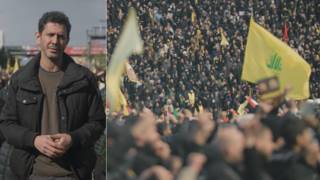
Thousands gathered in Beirut Sunday to mourn the death of Hassan Nasrallah, Hezbollah’s longtime leader who was killed in an Israeli airstrike in September. Under a ceasefire agreement, Israel withdrew its troops from southern Lebanon last week, but it continues to illegally occupy five locations in the country. Correspondent Sharif Abdel Kouddous traveled to Lebanon last week to report from the ground in southern Lebanon and to cover Nasrallah’s funeral, one of the biggest in the region in decades. The large turnout of thousands of Lebanese mourners was a “show of presence and of support for Hezbollah, which suffered heavy losses in Israel’s war on Lebanon,” Abdel Kouddous says.
This content originally appeared on Democracy Now! and was authored by Democracy Now!.This post was originally published on Radio Free.
-

Thousands gathered in Beirut Sunday to mourn the death of Hassan Nasrallah, Hezbollah’s longtime leader who was killed in an Israeli airstrike in September. Under a ceasefire agreement, Israel withdrew its troops from southern Lebanon last week, but it continues to illegally occupy five locations in the country. Correspondent Sharif Abdel Kouddous traveled to Lebanon last week to report from the ground in southern Lebanon and to cover Nasrallah’s funeral, one of the biggest in the region in decades. The large turnout of thousands of Lebanese mourners was a “show of presence and of support for Hezbollah, which suffered heavy losses in Israel’s war on Lebanon,” Abdel Kouddous says.
This content originally appeared on Democracy Now! and was authored by Democracy Now!.This post was originally published on Radio Free.
-
Hundreds of thousands gathered in the Lebanese capital on 23 February to take part in the funeral of the late Secretary-General of Hezbollah, Hassan Nasrallah, and his short-lived successor, Hashem Safieddine.
Mourners started to gather at the Camille Chamoun Sports City stadium in Beirut from the early hours of Sunday. Local estimates suggest that around 1.4 million people, including visitors from nearly 80 nations, united to pay their respects to the Lebanese resistance leaders killed by Israel.
“Today, we say farewell to an exceptional, historical leader, a national, Arab, and Islamic figure who has become a symbol of freedom for oppressed people worldwide,” Hezbollah Secretary-General Naim Qassem told the sea of people.
The post Massive Crowd Bids Farewell To Hezbollah Leader Hassan Nasrallah appeared first on PopularResistance.Org.
This post was originally published on PopularResistance.Org.
-
Israel has been accused of violating ceasefire agreements in both Lebanon and Palestine. In a classic move from the Zionists, they’re actually accusing Hamas of being the ones to violate the terms of the deal.
By the end of January 2025, Israel had killed at least 83 people in Lebanon. Meanwhile, in Palestine Israel has killed at least 118 people since the start of the ceasefire.
Since both ceasefires have been enacted, the BBC have been breathlessly running a live feed of the release of Israeli hostages as its lead story on the homepage. Whilst tens of Israeli’s have been released by Hamas, hundreds of Palestinians held without charge or trial, including children, have gone ignored.
What are people abducted from their homes and held without charge or trial, if not hostages? Once again, it is outlets from the Middle East who have been covering violations of ceasefire agreements.
Israel: incursions into territory
Al Jazeera reported that:
This week, Lebanese media reported repeated violations of the ceasefire agreement by the Israeli military, including attacks on the town of Taybeh and village of Kfar Kila, both on the border with Israel.
The United Nations Interim Force in Lebanon (UNIFL) released a statement as a February 18 deadline for Israel to leave certain areas in Lebanon passed with Zionist troops unmoved. They wrote:
Today marks the end of the period set for the withdrawal of the Israel Defense Forces south of the Blue Line and the parallel Lebanese Armed Forces deployment to positions in southern Lebanon, as envisaged by the Cessation of Hostilities Understanding of 26 November 2024.
Another delay in this process is not what we hoped would happen, not least because it continues a violation of United Nations Security Council resolution 1701.
They note that the IDF have withdrawn from areas of south Lebanon, which has enabled some Lebanese people to return home. UNIFL’s conclusion was that when the terms of the ceasefire deal are not respected:
sustained political commitment is the only way forward.
That appears to be the polite UN version of saying that unless political leaders stop enabling Israel’s absolute impunity, more Lebanese people will die.
The Armed Conflict Location & Event Data Project (ACLED) told Al Jazeera that Hezbollah has attacked once since the start of the ceasefire agreement:
Hezbollah has largely refrained from violence – there have been no direct attacks on Israeli soil since the ceasefire took effect, aside from a single attack on December 2 against the Israeli Rwayset Al Alam site in the occupied territories that we code as Syria.
Even by Israel’s absurd standards, Hezbollah have largely stuck to the ceasefire deal. Indeed, Hezbollah’s actions certainly stand in stark relief to the terror Israel continues to spread in Lebanon with attacks that are wounding and killing people who thought they were safe.
What ceasefire?
Since the so-called ceasefire in Palestine and Israel went into effect, Gaza’s health ministry has reported:
that 92 people have been killed and 822 were injured by the Israeli army since the start of the truce.
Hamas says that on top of these attacks, Israel has also delayed the return of displaced Palestinians to northern Gaza, which is one of the ceasefire agreement’s key commitments.
Hamas have also explained via a report that Israel have violated the ceasefire a shocking 269 times. Newsweek has seen a copy of the report which they said claimed that:
Israeli operations since the deal that was entered implementation last month have resulted in 26 deaths, 59 injuries, 105 aircraft violations, 36 gunfire violations, 29 ground incursions, nine instances of “bombardment” and the detention of five Palestinians drivers and fishermen.
Another violation was the delay of the release of hundreds of prisoners:
Israel also restricted family members, including those from the West Bank, from visiting the freed detainees and delayed providing a list of 400 Palestinian prisoners, according to the report.
A direct quote from the report laid out how statements from both Israel and the US threaten the viability of the remaining parts of the ceasefire:
continued political statements by [the] Israeli Prime Minister and ministers openly calling for the expulsion of Gaza’s population, sending a clear message that the occupation does not wish to honor the agreement and aims to implement Trump’s plan to displace Gaza’s residents.
In addition to wounding and killing Palestinians, Israeli forces have continued to spread terror in spite of the ceasefire. Under the ceasefire agreement, Israel was to allow in 600 aid trucks per day. Of course, this would take time to address the Israeli ravaging of Palestinian infrastructure. However, Gaza’s municipality spokesperson claimed that only around 100-150 trucks have been allowed in per day.
Israeli impunity
Israel has made a mockery of the supposed ceasefire agreements in both Lebanon and Palestine. They’re able to keep killing people, and to keep restricting the necessary conditions for life because international governments continue to allow them to. Trump has been belligerently fanning the flames of war, and Starmer has hardly been much better.
It was joyful to see Palestinians celebrate the ceasefire. Finally, after horrors upon horrors, they were able to have a moment of togetherness with their loved ones. A moment without terror raining down upon their heads. But, we all knew it was only ever going to be a moment.
No media outlet worth anything should continue to call Israel’s actions anything to do with a ceasefire. They’re nothing of the sort.
Featured image via the Canary
This post was originally published on Canary.
-
The Israeli army has maintained its occupation of at least five key locations in southern Lebanon after completing the withdrawal of most of its troops from the south early on 18 February.
Israeli forces continue to occupy Labbouneh, Mount Blat, Owayda Hill, Aaziyyeh, and Hammamis Hill.
According to AlJadeed’s correspondent, the “number of points from which Israeli occupation forces have not withdrawn has risen to seven, with its forces remaining on the international border road extending from Odaisseh to the entrance to Kfar Kila, along the border wall, and its positioning in the Batishiyeh area on the outskirts of Dhuhayrah, near the Al-Jardah site.”
The post Israel Maintains Occupation In Key Areas After Withdrawal From Lebanon appeared first on PopularResistance.Org.
This post was originally published on PopularResistance.Org.
-
Israeli Prime Minister Benjamin Netanyahu gifted President Donald Trump a golden pager mounted on a piece of wood in an homage to the horrific attack on Lebanon in which dozens of people were killed, including children, and thousands injured as a result of spontaneous explosions of pagers that had been rigged by Israeli authorities. Netanyahu’s office confirmed the gifting of the pager.
This post was originally published on Latest – Truthout.
-
 Houmam al-Sayed (Syria), Namle, 2012.
Houmam al-Sayed (Syria), Namle, 2012.One of the most stunning events of the past few months has been the fall of Damascus. This fall had initially been expected over a decade ago, when rebel armies funded by Qatar, Turkey, Saudi Arabia, and the United States crowded around the edges of Syria and threatened then President Bashar al-Assad’s government. These armies, backed by rich and powerful countries, were comprised of a range of actors, including:
-
swaths of people who were angered by the economic distress caused by the opening up of the economy and the subsequent devastation of small manufacturing businesses, which were suffering in the face of the emerging might of Turkish manufacturing;
-
the peasantry in the north, frustrated by the government’s lack of a proper response to the long drought that forced them into the northern cities of Aleppo and Idlib;
-
sectors of the secular petty bourgeoisie discontent with the failure of the Damascus Spring of 2000–01, which had initially promised political reforms stemming from the muntadayāt (forum discussions) held across the country;
-
a deeply aggrieved Syrian Muslim Brotherhood, formed out of the pious petty bourgeoisie, which had been crushed in 1982 and re-emerged after being inspired by the role the Brotherhood played in the 2010–11 protests in Tunisia and Egypt;
-
eager Islamist forces that had been trained by al-Qaeda in Iraq and wanted to fly the black flag of jihadism from the highest parapets in Damascus.
Despite the failure of these factions of the Syrian opposition in 2011, it was many of these same forces that succeeded in overthrowing Assad’s government on 7 December 2024.
Just over a decade ago, Assad’s government remained in power largely because of support from Iran and Russia, but also because of the involvement – to a lesser extent – of neighbouring Iraq and Hezbollah (Lebanon). Assad did not have the stomach for the contest. He became president in 2000 after the death of his father, Hafez al-Assad, who took office through a military coup in 1971. Bashar al-Assad had a privileged upbringing and studied to be an ophthalmologist in the United Kingdom. When the rebel armies neared Damascus in December of this year, Assad fled to Moscow with his family, claiming that he wanted to retire from politics and resume his career as an ophthalmologist. He did not make a statement to his people telling them to be brave or that his forces would fight another day. There were no comforting words. He left quietly in the same way he appeared, his country abandoned. A few days later, on Telegram, al-Assad released a text but was timid.
 Hakim al-Akel (Yemen), The Symbolic History of Arab Joy (Arabia Felix), 1994.
Hakim al-Akel (Yemen), The Symbolic History of Arab Joy (Arabia Felix), 1994.After being defeated by Syrian, Iranian, and Russian forces in 2014, the Syrian rebels regrouped in the city of Idlib, not far from Turkey’s border with Syria. That is where the main opposition force broke with al-Qaeda in 2016, took over the local councils, and shaped itself as the only leader of the anti-Assad campaign. This group, Hayat Tahrir al-Sham (Organisation for the Liberation of the Levant, or HTS), is now in charge in Damascus.
Originating directly from al-Qaeda in Iraq, HTS has not been able to shed those roots and remains a deeply sectarian body with ambitions to eventually turn Syria into a caliphate. Since his time in Iraq and northern Syria, HTS leader Abu Mohammed al-Jolani developed a reputation of great brutality toward the large number of minority groups in Syria (specifically Alawites, Armenians, Kurds, Shi’ites), who he regarded as apostates. Al-Jolani is well-aware of his reputation, but he has remarkably altered the way he presents himself. He has shed the trappings of his al-Qaeda days; he trimmed his beard, dresses in a nondescript khaki uniform, and learned to talk to the media in measured tones. In an exclusive interview with CNN released just as his forces took Damascus, al-Jolani recalled past murderous acts committed in his name merely as youthful indiscretions. It was as if he had been trained by a public relations company. No longer the al-Qaeda madman, al-Jolani is now being presented as a Syrian democrat.
On 12 December, I spoke to two friends from minority communities in different parts of Syria. Both said that they fear for their lives. They understand that though there will be a period of jubilation and calm, they will eventually face severe attacks and have already begun hearing reports of small-scale attacks against Alawites and Shia families in their network. Another friend reminded me that there was calm in Iraq after the fall of Saddam Hussein’s government in 2003; several weeks later, the insurgency began. Could such an insurgency of former government forces take place in Syria after they have recomposed from their state’s hasty fall? It is impossible to know what the social fabric of the new Syria will be like given the character of the people who have taken power. This will be especially true if even a fraction of those seven million Syrians who were displaced during the war return home and seek revenge for what they will surely see as the mistreatment that forced them overseas. No war of this kind ends with peace. There are many scores yet to settle.
 Safwan Dahoul (Syria), Dream 92, 2014.
Safwan Dahoul (Syria), Dream 92, 2014.Without detracting attention from the Syrian people and their well-being, we must also understand what this change of government means for the region and the world. Let us take the implications sequentially, starting with Israel and ending with the Sahel region in Africa.
-
Israel. Taking advantage of the decade-long civil war in Syria, Israel has bombed Syrian military bases on a regular basis to degrade both the Syrian Arab Army (SAA) and its allies (notably, Iran and Hezbollah). Over the past year, during its escalation of the genocide against Palestinians, Israel has also increased its bombing of any military facility it believes is being used to resupply Iran and Hezbollah. Israel then invaded Lebanon to weaken Hezbollah, which it achieved by assassinating Hezbollah’s long-time leader, Sayyed Hassan Nasrallah, and by invading southern Lebanon, where Hezbollah was rooted. As if coordinated, Israel provided air support to HTS as it moved out of Idlib, bombing Syrian military facilities and army posts to demoralise the SAA. When HTS took Damascus, Israel strengthened its Division 210 in the Occupied Golan Heights (seized in 1973) and then invaded the United Nations buffer zone (set up in 1974). Israeli tanks proceeded outside the buffer zone and came very close to Damascus. HTS did not contest this occupation of Syria at any point.
-
Turkey. The Turkish government provided military and political support to the 2011 rebellion from its inception and hosted the exiled Syrian Muslim Brotherhood government in Istanbul. In 2020, when the SAA moved against the rebels in Idlib, Turkey invaded Syria to force an agreement that the city would not be harmed. Turkey also enabled the military training of most of the fighters who proceeded down highway M5 to Damascus and provided military equipment to the armies to battle the Kurds in the north and the SAA in the south. It was through Turkey that various Central Asian Islamists joined the HTS fight, including Uyghurs from China. When Turkey invaded Syria twice over the past decade, it held Syrian territory that it claimed was its historical land. This territory will not return to Syria under the HTS government.
 Fateh al-Moudarres (Syria), Child of Palestine, 1981.
Fateh al-Moudarres (Syria), Child of Palestine, 1981.-
Lebanon and Iraq. After the fall of Saddam Hussein’s government in 2003, Iran built a land bridge to supply its allies in both Lebanon (Hezbollah) and Syria. With the change of government in Syria, resupplying Hezbollah will become difficult. Both Lebanon and Iraq will now border a country ruled by a former al-Qaeda affiliate. While it is not immediately clear what this means for the region, it is likely that there will be an emboldened al-Qaeda presence that wants to undermine the role of the Shia in these countries.
-
Palestine. The implications for the genocide in Palestine and for the struggle for Palestinian liberation are extraordinary. Given Israel’s role in undermining Assad’s military on behalf of HTS, it is unlikely that al-Jolani will contest Israel’s occupation of Palestine or allow Iran to resupply Hezbollah or Hamas. Despite his name, which comes from the Golan, it is inconceivable that al-Jolani will fight to regain the Golan Heights for Syria. Israel’s ‘buffers’ in Lebanon and Syria add to the regional complacency with its actions achieved by events such as its peace treaties with Egypt (1979) and Jordan (1994). No neighbour of Israel will pose a threat to it at this time. The Palestinian struggle is already experiencing great isolation from these developments. Resistance will continue, but there will be no neighbour to provide access to the means for resistance.
-
The Sahel. Since the United States and Israel are basically one country when it comes to geopolitics, Israel’s victory is a victory for the United States. The change of government in Syria has not only weakened Iran in the short term but has also weakened Russia (a long-term strategic goal of the United States), which previously used Syrian airports to refuel its supply planes en route to various African countries. It is no longer possible for Russia to use these bases, and it remains unclear where Russian military aircraft will be able to refuel for journeys into the region, notably to countries in the Sahel. This will provide the United States with an opportunity to push the countries that border the Sahel, such as Nigeria and Benin, to launch operations against the governments of Burkina Faso, Mali, and Niger. This will require a close watch.
 Djamila Bent Mohamed (Algeria), Palestine, 1974.
Djamila Bent Mohamed (Algeria), Palestine, 1974.In July 1958, several poets organised a festival in Akka (occupied Palestine ’48). One of the participating poets, David Semah, wrote ‘Akhi Tawfiq’ (My Brother Tawfiq), dedicated to the Palestinian communist poet Tawfiq Zayyad who was in an Israeli prison at the time of the festival. Semah’s poem grounds us in the sensibility that is so sorely needed in our times:
The post How to Understand the Change of Government in Syria first appeared on Dissident Voice.If they sow skulls in its dirt
Our harvest will be hope and light.This post was originally published on Dissident Voice.
-
-
The Lebanese Foreign Ministry has filed a complaint against Israel to the UN Security Council (UNSC) over its constant violations of the ceasefire that was reached at the end of last year.
Lebanon expressed its rejection of “systematic Israeli attacks and violations” and Israel’s removal of the signs on the withdrawal line in southern Lebanon, in the complaint filed on 4 February.
Beirut also demanded that the UNSC issue a firm and clear position on Israel’s continuous violations and oblige it to respect the terms of the ceasefire agreement.
The complaint called on the Security Council to back support for the Lebanese Armed Forces (LAF) and UNIFIL forces “to guarantee the protection of the Lebanese sovereignty and the safety of the Lebanese citizens.”
The post Lebanon Demands ‘Firm Stance’ From UNSC Over Israeli Ceasefire Violations appeared first on PopularResistance.Org.
This post was originally published on PopularResistance.Org.
-
The people of southern Lebanon did not wait long before deciding to return to their towns and villages devastated by Israeli assaults, after the 60-day deadline set for the complete withdrawal of the Israeli occupation forces from the area expired at 4:00 am on January 26, 2025.
Israeli Prime Minister Benjamin Netanyahu had announced that the Zionist occupation forces would not meet the deadline set for their withdrawal from southern Lebanon, in a breach of the terms of the ceasefire agreement that ended the war, further exposing “Israel’s” aggressive and expansionist nature.
The post People Of Southern Lebanon Defy Zionist Invaders And Return Home appeared first on PopularResistance.Org.
This post was originally published on PopularResistance.Org.
-
The head of Hezbollah’s Loyalty to the Resistance parliament bloc, Mohammad Raad, slammed the international community’s inaction regarding Israel’s ceasefire violations, stressing the Lebanese people’s “legitimate and sacred” right to confront the Israeli occupation.
Raad’s statement came a day after the Israeli army launched airstrikes on Nabatieh and Zawtar in south Lebanon – one of the deepest attacks since the ceasefire was reached in late November.
“The treacherous and condemned Zionist aggression on the southern towns of Nabatieh al-Fawqa and Zawtar last night is a new example of the permanent and ongoing threat posed by the Israeli entity against our people and our country and against the security and stability of all the peoples and countries of our region,” Raad said.
The post Hezbollah Blasts International Community’s ‘Chronic Indifference’ To Israeli Violations appeared first on PopularResistance.Org.
This post was originally published on PopularResistance.Org.
-
Not only did Israel fail to evacuate its army from Southern Lebanon on Sunday, as stipulated in the ceasefire agreement, its forces also shot over 130 Lebanese civilians attempting to return home in accordance with the deal, killing 23 and wounding 109 (of whom some are in critical condition).
This included a 12-year-old boy wounded in the neck in Kfarkela, standing right next to my local producer Mahmood. I was 20 yards away and on my way to them. Four were killed in Kfarkela and overnight the Israeli army demolished numerous homes there in “punishment.”
The post Israeli Atrocities Continue In Lebanon appeared first on PopularResistance.Org.
This post was originally published on PopularResistance.Org.
-
The Israeli military is planning to continue occupying southern Lebanon past the deadline set forth in Israel’s ceasefire agreement with Hezbollah, Israel Prime Minister Benjamin Netanyahu has said. Under the terms of the deal, agreed to in November, Israel and Hezbollah were supposed to withdraw from southern Lebanon by this Sunday, January 26. They were to be replaced by troops from the…
This post was originally published on Latest – Truthout.
-
The Qatari Minister of Foreign Affairs, in a pivotal announcement on Wednesday evening, confirmed that Israel and the Islamic Resistance Movement (Hamas) have finalized a deal designed to halt Israel’s genocidal and destructive war in the Gaza Strip for at least 42 days. This accord is essentially a reworking of the previously proposed ceasefire arrangement in May by the Biden administration, when Hamas declared its acceptance of the ceasefire agreement, while Israel reneged on it and continued with the war. It turned out Israel wanted time to both bring out more destruction in Gaza, more death, and use its mix of cards to subdue Hezbollah in Lebanon.
The post Gaza Ceasefire Reveals Israel’s Fragility appeared first on PopularResistance.Org.
This post was originally published on PopularResistance.Org.
-
The U.S. took advantage of a changing regional and domestic environment to make a favorable arrangement for itself this time. But the notion that it can drag Lebanon into the pro-Israeli orbit of the Gulf will prove illusory.
The post A History Of Foreign Intrigue In Lebanon appeared first on PopularResistance.Org.
This post was originally published on PopularResistance.Org.
-
Last week I did two short video reports from outside the Lebanese Parliament — inside a military cordon that totally sealed off downtown Beirut — on the appointment of General Joseph Aoun, head of the Lebanese Armed Forces, as president of Lebanon.
There is no other Western source giving any of this detail — not even that it is directly unconstitutional for a present or former head of the Armed Forces to become president in Lebanon. This report by William Christou is fascinating because it is a dark image mirror of my report. The facts are the same, but presented in a neoliberal rose-coloured light.
The post US Pet Now President Of Lebanon appeared first on PopularResistance.Org.
This post was originally published on PopularResistance.Org.
